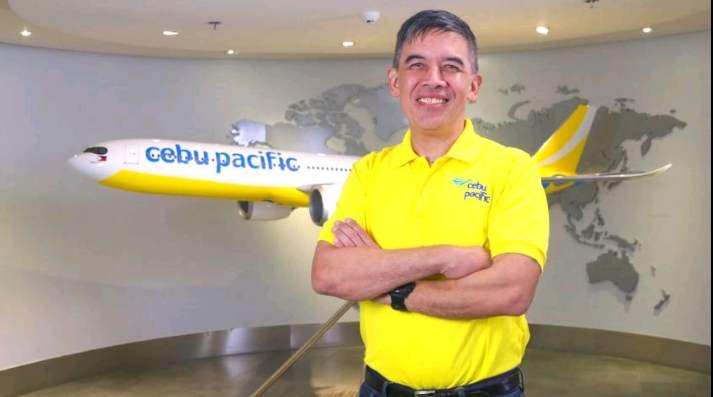Cebu Pacific Air (CEB), in a recently concluded Aviation Summit 2023 themed “Philippine Aviation: Ready for Takeoff” held on September 27 and 28 at the Mariott Hotel Manila, has announced that its Japan (Narita) to Manila flight on October 25, 2023 will be powered by blended Sustainable Aviation Fuel (SAF), use of which will help reduce the carbon footprint per flight passenger by 42%.

Cebu Pacific Air Chief Strategy Officer Alex Reyes
Cebu Pacific Air Chief Strategy Officer Alex Reyes made the announcement through his presentation entitled Sustainable Aviation Fuel: The Key to Decarbonizing Aviation.
In 2022, Cebu Pacific became the first local airline company to operate the SAF-powered commercial operations at the inauguration of its Singapore to Manila flight. This coincided along with the airline’s four delivery flights of Airbus 320 New Engine Options (NEOs), also powered by SAF.
The initiative, a first of its kind by a Philippine-based carrier, is a manifestation of Cebu Pacific’s commitment to being one with the global aviation industry’s aim at achieving net-zero transition to 2050.
This year, the airline has carried out the delivery of 10 new A320 NEOs, and the first delivery from Airbus’ Tianjin, China plant. Being up to 20% more efficient than the previous generation, the A320 NEO consumes as little as 2.46 kilograms of fuel per seat per 100 kilometers.
SAF is an expensive fuel—twice to up to five times more costlier than fossil jet fuel. But in spite of this, Cebu Pacific is not holding back, willing to do its share by operating sustainably, avoiding further harm to the environment.
“We are seeing high prices today because actual production is tiny and most of the plants built are small scale. Eventually it will come down, overtime. It takes you three to five years to build an SAF plant,” says Reyes.
Achieving net-zero requires a combination of three levers of action: reduce, neutralize and eliminate emissions, and SAF will deliver bulk of the emissions reductions, according to International Air Transport Association (IATA), Net zero 2050 sustainable aviation fuels. IATA estimates the emission reduction via SAF to be at about 65%.
SAF is a drop-in fuel, with similar characteristics as conventional jet fuels, but does not require any adaptation to the aircraft or engines, and with negative impact on performance. It is the highest percentage blend ever used by Cebu Pacific, which marks a significant advancement in the airline’s sustainable aviation initiatives.
Reyes adds that the airline’s short-term goal is to incorporate more SAF in regular operations. This year almost all of the company’s flights have been fueled with a blend of SAF.